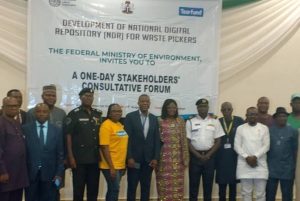The Federal Government of Nigeria on Tuesday, August 20, 2024, in Abuja, promised to develop a National Digital Repository for waste pickers to address the numerous challenges they face while performing their duties.

Malam Balarabe Lawal, Minister of Environment, made this statement at a meeting on the National Digital Repository for Waste Pickers in Nigeria.
“We cannot discuss sustainable waste management without referencing the operations of waste pickers, who form an integral part of the waste management value chain.
“Waste pickers exist as unsung heroes, but the truth is that they provide essential services that ensure the protection of our environment and public health,” Lawal said.
The meeting was a collaboration between the Federal Ministry of Environment, International Labour Organisation (ILO), and Tearfund Nigeria.
Lawal stated that waste pickers, popularly known as “Baban Bolla,” are the backbone of waste recovery, contributing significantly to recycling and the circular economy.
“They form an informal group whose activities encompass all aspects of waste management, from collection, sorting, transportation, processing, and selling of recovered and recyclable materials to earn a living.
“The growing demand for recyclable materials and the transition to a circular economy make it imperative for governments and the general public to recognise, regulate, and integrate waste pickers into the overall waste management effort.”
The minister added that the integration of waste pickers would unlock the immense economic potential using them as reliable foot soldiers.
Lawal said that there was a growing recognition that waste pickers contributed to local economy, public health, safety and environmental sustainability but faced with negative public perception.
He further noted that waste pickers live in deplorable conditions and get very little support from government both at the national and subnational levels, which he said was not peculiar to Nigeria.
“Globally, there is an increasing recognition of the role of waste pickers in the plastic management, and great effort is being made by local authorities to integrate and create partnerships with waste pickers associations.
“There is improvement in the level of engagement with waste pickers associations in the formulation of solid waste management policy and the national plastic policy,” the minister said.
On his part, Vanessa Phala-Moyo, Country Director, International Labour Organisation for Nigeria, said that a concerted effort was required to ensure that waste streams were effectively controlled using sound waste management practices.
Phala-Moyo noted that, when managed well, waste offered opportunities for creation of jobs in the circular economy and also contributed to strengthening the resilience of local economies.
The Commissioner of Police FCT, Kenneth Igweh, who was represented by CSP Austine Anaiah, promised that the Nigerian Police and other security agencies would go after the perpetrators of crime in the FCT who disguised as waste pickers.
Also, Chiranjibi Tiwari from UNICEF said that Nigeria produced a huge amount of waste each year and, if not managed properly, it might create several health hazards.
“Therefore, waste pickers, who are at the beginning of the waste management cycle (segregation, collection, transportation, processing, re-use/recycling), are a critical part of our environmental management and health,” he noted.
By Abigael Joshua
